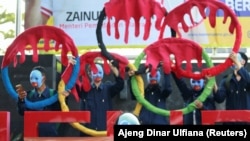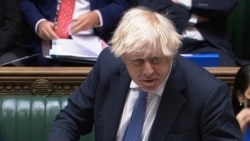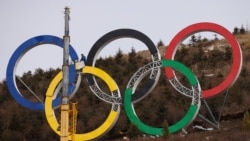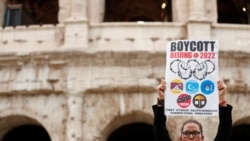With less than two months before the 2022 Beijing Winter Olympics open, China has been facing a widening diplomatic boycott.
To protest alleged human rights abuses by China, the Biden administration announced December 6 that it would not send government officials to the games, though U.S. athletes would compete.
Some U.S. allies, including Australia, United Kingdom, Canada, New Zealand and Kosovo, followed suit, though New Zealand cited "mostly" pandemic concerns. Japan is the latest to join the boycott, announcing December 11 that it probably won't send Cabinet ministers.
Beijing has called the diplomatic moves a "self-staged farce" and vowed that boycotters "will pay a price for their erroneous moves." Beijing has also repeatedly accused the United States and others of violating the Olympic Charter.
"Any act that attempts to politicize sports in the name of human rights and freedom violates the spirit of the Olympic Charter," Chinese Foreign Ministry spokesperson Wang Wenbin said on December 9.
That is false. Although the Olympic Charter mandates "political neutrality" for sports organizations, promotion of human rights is front and center in the charter itself.
The Olympic Charter is the codification of the seven Fundamental Principles of Olympism, the rules and bylaws adopted by the IOC.
"The Olympic Movement's commitment to protecting human rights is codified in the Olympic Charter," reads a 2018 article published by the IOC as the world celebrated the 70th anniversary of the Universal Declaration of Human Rights.
"It is more important than ever to ensure that the Olympic Games and sport in general continue to be an expression and promoter of human rights," the article said.
A page titled "Respecting Human Rights" on the IOC website states that "at all times, the IOC recognizes and upholds human rights, as enshrined in both the Fundamental Principles of the Olympic Charter and the IOC Code of Ethics."
The first Fundamental Principle of Olympism states that "Olympism seeks to create a way of life based on the joy of effort, the educational value of good example, social responsibility and respect for universal fundamental ethical principles." The second principle states that "the goal of Olympism is to place sport at the service of the harmonious development of humankind, with a view to promoting a peaceful society concerned with the preservation of human dignity." (Italic emphasis added.)
The charter makes more explicit references to human rights in the fourth principle, where it recognizes that "the practice of sport is a human right" and "every individual must have the possibility of practicing sport, without discrimination of any kind."
The sixth principle clarifies that "the enjoyment of the rights and freedoms set forth in this Olympic Charter shall be secured without discrimination of any kind, such as race, color, sex, sexual orientation, language, religion, political or other opinion, national or social origin, property, birth or other status."
"At its core, human rights is about valuing and ensuring individual dignity. Respect for peoples' dignity is fundamental to the IOC's values and the mission of advancing Olympism," reads a March 2020 report on IOC's human rights approach published on the organization's website.
The IOC announced in February 2017 that it had revised its host city contract and added human rights principles to it to prevent rights abuses by future Olympic hosts. The new contract was first applied in the bidding for the 2024 Summer Olympics, scheduled for Paris, France.
Critics called IOC's decision to start applying the new contract to the 2024 Games – rather than immediately pressure Beijing to observe the new contract – a "double standard."
The diplomatic boycotts of the 2022 Beijing Games arise from widespread condemnation of China's treatment of Muslim Uyghurs in Xinjiang; of pro-democracy activists and legislators in Hong Kong; of Chinese human rights lawyers who defended political dissidents; and of citizen journalists who reported on the initial outbreak of COVID-19 in Wuhan in late 2019.
Extensive allegations of atrocities in Xinjiang have included reports of mass arbitrary detention, separation of families, forced labor, torture, sexual violence, reproductive rights violations, and cultural and religious erasure. Human Rights Watch this year has labeled all as crimes against humanity.
Amnesty International has called China's actions "draconian." The rights group published a 160-page report based on testimony from former detainees: "'Like We Were Enemies in a War': China's Mass Internment, Torture, and Persecution of Muslims in Xinjiang."
An unofficial British-based tribunal concluded last week that China's treatment of Uyghurs is tantamount to genocide, a stance also taken by the United States and some Western governments. The United Nations High Commissioner for Human Rights is expected to weigh in this month with a report that has been long delayed for lack of access to Xinjiang.
"Beijing's mistreatment of Xinjiang's 13 million ethnic minority Muslims stands in stark contrast to the Olympic ideals of celebrating human achievement and dignity," says Minky Worden, director of global initiatives at Human Rights Watch.
Polygraph.info has covered many allegations concerning Uyghurs in Xinjiang, including China's steadfast denials of wrongdoing and justifications for its treatment of the minority group and others.
Legal scholars have long argued for using the Olympic Games as a vehicle for human rights reforms.
In 1982, the IOC adopted a draft declaration that sought to integrate its rules and principles of international sports law into the United Nations framework, wrote legal scholar Paul Mastrocola in 1995. The main purpose was to make explicit that the Olympic Charter constitutes international law.
Mastrocola argued that the institutional framework for the regulation of international sports is based on the Olympic Charter as a customary international law, sanctioned by the United Nations, and enforced by the IOC. The IOC's role is to realize the goals of the Olympic Movement and promote the Olympic ideal of seeking a better and more peaceful world.
Julie Liu, then a law student at Northwestern University School of Law, also argued in 2007 for the legitimate use of the Olympic Games as a tool for enhancing human rights. She cited James Nafziger, a scholar on international sports law, who suggested that the principles and provisions of the Olympic Charter attempt to protect and promote human rights, but also emphasized that "there are no rights without a remedy."
Liu wrote that "the IOC can provide that remedy since it is controlled by these fundamental principles and as such, can implement its authority under the language of the Olympic Charter to prompt compliance of international human rights law."
Mastrocola also analyzed the tension between the first and second Fundamental Principles of Olympism, which call for the preservation and promotion of human rights, and the fourth and sixth principles, which speak against exclusion for political reasons.
Mastrocola wrote: "The growing body of international human rights law, including United Nations efforts to offer protection from human rights abuses during the 1970s, appears to have tipped the scale toward Olympic consciousness of human rights problems.
"Because the IOC must comply with United Nations mandates and with human rights law, the political use of international sports for protecting human rights is legitimate."
There is irrefutable history of using the Olympic Games to exert pressure to promote human rights. Examples include the exclusion of South Africa from the Olympic Games during its apartheid era and the full boycott of the 1980 Moscow Summer Olympics by 65 countries, led by the United States, to protest the Soviet invasion of Afghanistan. (In retaliation, the Soviets led a boycott of the 1984 Summer Games in Los Angeles.)
China, which had recently established full diplomatic ties with the United States, was among the 65 boycotters in 1980. Now, a People's Daily editorial, published in February 1980 and arguing for the necessity of a boycott, has been circulating on social media.
"Sports and politics are, of course, separate matters," the editorial states. "The question facing the people of the world today, however, is precisely whether the Soviet Union can be allowed to use an international sport event like the Olympic Games to whitewash its hegemonism."
Rights activists who have been supporting a boycott of the Beijing games worry that the Chinese government is "sports-washing" abuses by using the prestige and grandeur of the Olympic games to elevate the status of the ruling Chinese Communist Party at home and abroad.










